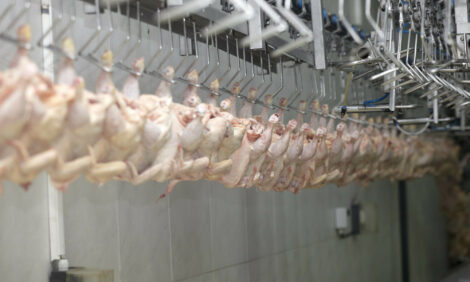



Bird flu clouds Brazil chicken outlook - CME
Cattle climb on tight supply, holiday demandChicago Mercantile Exchange (CME) live cattle turned higher on Thursday, as traders adjusted their positions ahead of the Memorial Day holiday weekend and wholesale prices continued to rise on consumer beef demand, Reuters reported, citing market analysts.
CME feeder cattle futures also firmed, with the most-active August contract touching a one-week high, as prices continued to firm in Midwest cash markets, traders said.
Meanwhile, the hog market ended the day mixed on technical trading, and continued softness in wholesale pork belly prices, with nearby contracts lower and deferred months turning higher.
The nearby CME lean hog June contract settled down 0.825 cent to 98.700 cents per pound, while the most active July contract closed down 0.475 cent to 102.050 cents per pound.
CME most-active August live cattle futures settled up 1.850 cents to 210.500 cents per pound. CME August feeder cattle futures ended 3.350 cents higher at 299.775 cents per pound.
Traders said they will be closely watching the sell-through rate at grocery meat counters over the long Memorial Day weekend, and how that might impact retailer buying for the Father's Day holiday, Norcini said.
Expectations that the US Department of Agriculture's (USDA) Friday cattle on feed report will show tight cattle stocks have also kept support under prices, analysts said.
US May 1 cattle on feed are estimated to be down 3.2% from a year ago, a Reuters poll of analysts showed.
"The supply side is pretty much known at this point, unless there's some really drastic surprise in the report," said Dan Norcini, an independent livestock analyst.
Boxed beef prices continued to rise. Choice cuts of boxed beef rose $1.38 to $360.97 per cwt, while select cuts rose 67 cents to $348.95 per cwt, USDA data on Thursday afternoon showed.
Livestock traders also said they were tracking news that Brazil began a 28-day bird flu observation period, which it hopes will show the country's chicken farms are free of the disease, was seen as somewhat negative for livestock futures, traders said.









